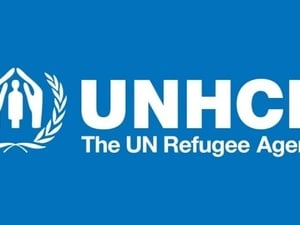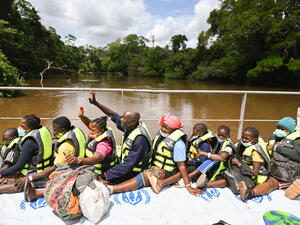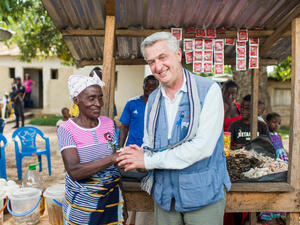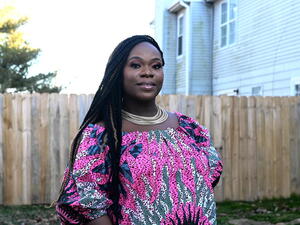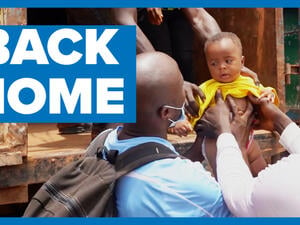High-ranking Liberian delegation impressed by skills of refugees in Ghana
High-ranking Liberian delegation impressed by skills of refugees in Ghana
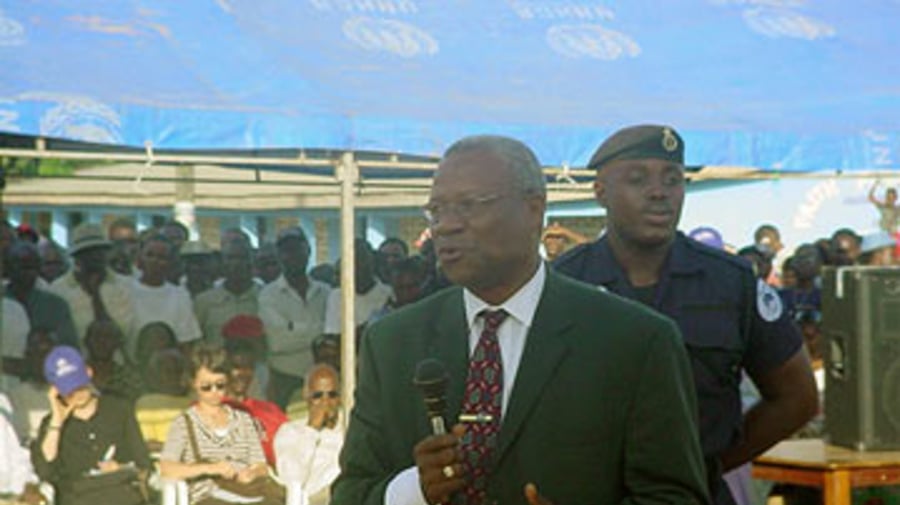
Liberian Minister of Internal Affairs Ambulai Johnson addresses refugees at the Buduburam settlement in Ghana.
ACCRA, Ghana, July 18 (UNHCR) - Members of a high-level Liberian government delegation have come away from a visit to Ghana saying they were impressed by the level and variety of skills shown by Liberian refugees and hoped they could be used to help rebuild their homeland.
The five-member delegation, led by Minister of Internal Affairs Ambulai Johnson, wrapped up a four-day trip on Sunday after touring two refugee settlements and meeting Ghanaian government officials, diplomats and representatives of UNHCR and other agencies.
The visit - the first of its kind since the launch of a UNHCR voluntary repatriation programme in October 2004 - was aimed at furthering the new Liberian government's commitment to bringing back the tens of thousands of refugees who fled to other countries to escape civil war in Liberia during the 1990s. There are an estimated 38,000 Liberian refugees in the sprawling Buduburam settlement near Accra and the Krisan settlement in south-west Ghana.
Accompanied by UNHCR representatives, the delegates held open meetings with members of the two refugee communities in the hope of persuading undecided Liberians to return home and contribute to national reconstruction. They said they were impressed by the wide range of skills and expertise many of the refugees had picked up.
The main concerns of the refugees, some of whom had not been home in 16 years, included shelter and employment opportunities. Johnson told refugees in Buduburam about democratic progress in Liberia, including the election last year of President Ellen Johnson-Sirleaf, adding that lack of teachers, health-care workers and construction crews was a great opportunity for the skilled refugees.
"If Her Excellency the president is making an appeal for you to come back home, she is doing it against the background that when you return, there are measures in place to absorb you. Obviously, if there isn't, you'll be idle and there'll be trouble and she doesn't want trouble," the minister said last Thursday.
Delegation member Wheatonia Dixon Barnes, executive director of the Liberian Refugee Repatriation and Resettlement Commission, urged the refugees to return home and take advantage of UNHCR-funded micro-credit schemes for cooperatives and the National Investment Commission's loan scheme, which targets small- and medium-scale enterprises. She highlighted opportunities for youth and women, saying: "These are exciting times in Liberia for women."
Aida Haile Mariam, the UNHCR representative in Ghana, also called on the refugees to return. "The international community is focusing its attention on your home country which means that assistance in asylum will only keep dwindling," she said, adding: "Your skills are critically needed there and you could resume normal lives."
Johnson also told the refugees about government plans to cultivate 120,000 acres of land over a five-year period. "We are happy to receive this news and will rally ourselves to return to the interior of Liberia to farm and let Liberia be able to feed herself again," said Varney B. Sambolla, a refugee in Buduburam who returned home in April on a UNHCR-organised fact finding mission.
Rebuilding Liberia will take time, but progress has been made in areas such as disarmament, security and human rights. Some 3,500 Liberian refugees have returned home from Ghana since October 2004.
UNHCR gives returning Liberian refugees an assistance package that includes food and relief items, counselling and the opportunity to acquire new skills. The voluntary repatriation operation is scheduled to end in June 2007.
By Needa Jehu-Hoyah in Accra, Ghana


